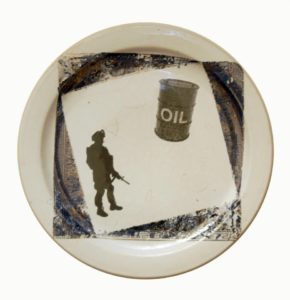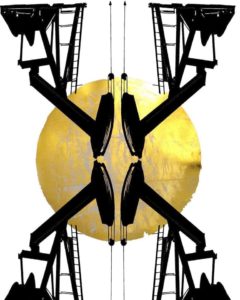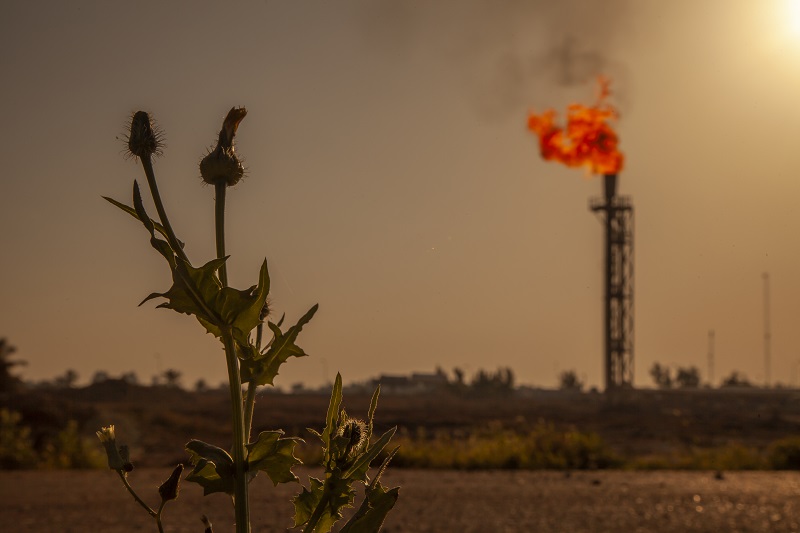‘BP, ExxonMobil and others have systematically been grabbing control over the Iraqi oil industry ever since the US invasion… The people of Iraq gain very little from their own oil industry and in fact have to ask how does it benefit us at all? We get environmental problems, higher cancer rates, but the money doesn’t go to improving conditions for the people.”
– Hassan Juma’a Awad, president of the Iraq Federation of Oil Unions

The first oil contract following the Iraq war was dubiously allocated to BP and the Chinese National Petroleum Company. It was signed in 2009 to develop Southern Iraq’s super-giant Rumaila oilfield – the third largest in the world, representing nearly half of Iraq’s output. The companies were set to receive returns of up to $660 million per year for the next 20 years.
This followed a major push by Britain and the US to force an Oil Law through the Iraqi parliament that legalised oil privatisation in Iraq. The law was not passed, largely because of a popular Iraqi campaign against it. It was then decided to sign long-term contracts with foreign oil companies even though there was no legal basis for doing so, and BP was at the front of the queue.
The Rumaila contract was opposed by many in Iraq, including oil experts, the management of the South Oil Company (which would have to work with BP on the Rumaila field), the oil trade union and the parliamentary oil and gas committee. Many decried it as illegal, since it was approved by the oil minister, circumventing the Iraqi parliament which was supposed to have the final say according to the country’s constitution. Behind the scenes, BP changed the terms significantly from the public auction result which, combined with the way the oilfield was subsequently run, resulted in greater profits for the oil company, at the expense of the Iraqi people.
At the time, output from the field was 1.1 million barrels per day (bpd). By the following year the field was producing 1.45 million bpd and in August 2018 plans were made to boost crude output to 2.1 million bpd by 2020. The contract runs until 2034 after it was extended in 2014. See section 5 for the climate change implications of this.
In January 2018, following the defeat and withdrawal of Daesh (Islamic State), BP signed a Memorandum of Understanding to develop the newly accessible Northern Iraqi Kirkuk oilfield. Kirkuk is another of the biggest oil fields in the Middle East, and one whose riches had first enticed BP’s precursor (the Anglo-Persian Oil Company) into the newly-formed state of Iraq to start extracting its resources in the 1920s. The final contract has yet to be signed, but, as with Rumaila, there is little transparency on the part of BP about its planned activities.
Dependent on oil
Currently, the Iraqi economy is almost completely reliant on oil production. In 2012 almost 45% of Iraq’s GDP was dependent on oil, with only Kuwait, Libya and Saudi Arabia having a higher proportion of oil-dependent GDP. In 2013 99.8% of Iraq’s exports were fuel-related, the highest in the world, and in 2017 OPEC’s statistics show that the value of petroleum exports were 94.34% of total Iraqi exports. The second largest commodity sector in Iraq is agriculture, which is responsible for only 5% of the country’s GDP.

This leaves the Iraqi economy vulnerable to fluctuations in oil prices as well as any global attempts to limit oil production in response to climate change. The large amounts of oil money flowing to corrupt local and national officials means that it is not being invested back in the infrastructure and services that the people of Iraq most desperately need. It also means that it is more difficult to find investment for other more sustainable social and economic ventures.
Criticisms of BP
BP is seen by ordinary Iraqis as one of the worst offenders amongst the foreign oil companies. While BP claims that it is employing Iraqi workers and ‘giving back’ to the community, locals complain that in reality, Iraqi workers are usually paid a small percentage in comparison to foreign workers, who also take most of the better-paid jobs, despite plenty of Iraqi expertise being available.
In the words of Iraqi economist Kamil Mahdi,
‘Extreme health and energy-poverty conditions have worsened as the activities of BP and other companies have expanded and as oil production and exports increased. It is not good enough for these companies to claim they are not directly responsible for the outcome.’
Mahdi argues that in the cases of Rumaila and Kirkuk, BP is taking over what was a functioning national company and effectively incapacitating it for decades to come, taking away Iraq’s ability to integrate the oil industry in its own economy. He adds that the costs of the foreign companies’ operations generally have been excessively high and charged to Iraq. These include exaggerated pricing for fairly standard contracts and expensive offices, facilities, recreation and travel for senior foreign staff. He also argues that the terms of BP’s operations mean the company carries very little risk.
__________
Continue to the next section: BP is depleting and polluting Southern Iraq’s scarce water supplies
Return to the introduction: From war to warming: the shameful story of BP in Iraq
